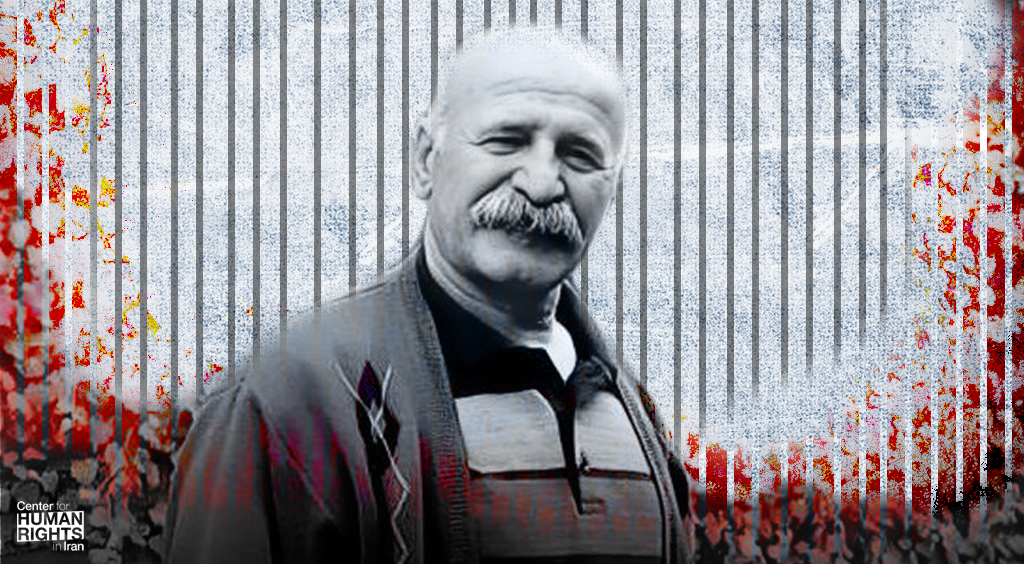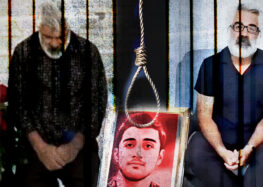Unlawfully Imprisoned Activist and Organizer of Mahsa Jina Amini’s Funeral Must Be Released on Medical Grounds
 Medical Examiner: Osman Esmaili “Could Not Withstand Further Imprisonment”
Medical Examiner: Osman Esmaili “Could Not Withstand Further Imprisonment”
Sentenced to Prison After “Two-Hour Trial,” Denied Counsel of Choice
February 8, 2024 – Iranian authorities should immediately release Osman Esmaili, an unlawfully imprisoned labor and human rights activist who is suffering from serious and untreated health conditions in Saqqez Central Prison and has been deemed unfit for prison by a medical examiner, according to information provided to the Center for Human Rights in Iran (CHRI).
“Prison authorities are not paying attention to his dire health, and no measures have been taken to treat and deal with his illnesses,” a source with detailed knowledge of his case told CHRI, adding that a medical examiner had stated that Esmaili “could not withstand further imprisonment.”
Prison conditions have worsened the 63-year-old activist’s health problems, including heart disease, asthma, rheumatism, and a “herniated disc which needs to be operated on as soon as possible,” said the source who spoke on the condition of anonymity for security reasons.
According to Article 502 of Iran’s Criminal Procedure Code, if the prisoner’s condition necessitates it, the judicial authorities must order the transfer of the prisoner to a suitable medical facility outside the prison for treatment. Yet despite his family posting the equivalent of $20,000 USD in bail, Esmaili has been denied release or medical furlough.
Human rights organizations including CHRI, as well as the UN, have expressed serious concerns over the Islamic Republic of Iran’s continued denial of sufficient medical treatment to detainees and prisoners, which violates the UN’s Standard Minimum Rules for the Treatment of Prisoners and which has led to the deaths of political and non-political detainees and prisoners.
CHRI calls on the international community, including the U.N. High Commissioner for Human Rights, the Human Rights Council, the special rapporteur for human rights, and all Member States to demand that the Iranian authorities provide immediate and full treatment for all prisoners, including political prisoners who have long been targeted for denial of medical care.
In January 2024, Esmaili, an ethnic Kurd, was transferred from Saqqez Central Prison in Kurdistan Province to Evin Prison in Tehran, ostensibly where the facilities are better for medical treatment, but then denied entry to Evin and sent back, with no treatment.
“They just wanted to harass him,” said the source. “The whole transfer episode took 18 hours; imagine how he suffered in the car during all that time, with his serious health condition.”
Esmaili, a veteran labor activist in Iran who has been arbitrarily arrested for his peaceful activism multiple times since 2013, helped organize the funeral of Mahsa Jina Amini in September 2022. Amini was a 22-year-old woman whose killing in state custody just three days after she was arrested for her alleged inappropriate hijab sparked months of anti-state protests. Since then, the Islamic Republic has been using various tactics including arbitrary arrest and imprisonment to silence any activists who have supported Amini’s family or those protests, which came to be known as the “Woman, Life, Freedom” movement.
“He was also one of the speakers at Amini’s ceremony,” said the source. “While airing his speech, Islamic Republic of Iran Broadcasting organization [state media] in Sanandaj marked him and others in ‘red,’ alleging they were the main ‘riot’ leaders.”
Smeared by State Media, Denied Counsel of Choice During Sham Trial
Esmaili’s most recent arrest occurred in Saqqez, Kurdistan province, in February 2023.
After several hours of interrogation without access to counsel of his choice, he was transferred to the Ministry of Intelligence’s office in Sanandaj, the provincial capital, and held for close to three months.
Meanwhile, Akam News, a website closely affiliated with the Ministry of Intelligence’s office in Sanandaj, began publishing reports about Esmaili, which were used as “evidence” in court.
Esmaili’s trial was held on July 26, 2023, in Branch 1 of the Islamic Revolutionary Court in the city of Sanandaj. He was denied access to his chosen lawyer and instead forced to accept a state-appointed lawyer named Farzad Nasrollahi.
In court, Esmaili defended his peaceful activities during the “Woman, Life, Freedom” uprising as well as his actions as a trade unionist, but rejected any links alleged by the state with the Komala Party, a Kurdish opposition group.
The trial lasted less than two hours. The judge sentenced him to one year and four months in prison. The verdict was appealed all the way to the Supreme Court, where it was ultimately upheld. On November 13, 2023, Esmaeili was transferred to Saqqez Central Prison.
In the 1980s, Esmaili was exiled to the southeastern city of Kerman for 25 years for the same charge of membership in Komala. After his return to Saqqez in the late 2000s, he was arrested many times: in 2013, 2015, 2017, 2019, 2020, and 2021.
Esmaili was also arrested and imprisoned on numerous occasions for participating in peaceful rallies marking International Labor Day and International Women’s Day in Iran, as well as other peaceful trade union activities. Each time he was sentenced to several months in prison or ordered to pay a fine. He was never represented by his own chosen lawyer.
Activists from members of minority communities in the Islamic Republic suffer especially harsh state retribution and persecution. They are routinely sentenced to long prison terms after sham trials, and are also disproportionally sentenced to death.
Read this report in Persian
This report was made possible from donations by readers like you. Help us continue our mission by making a tax-deductible donation.






